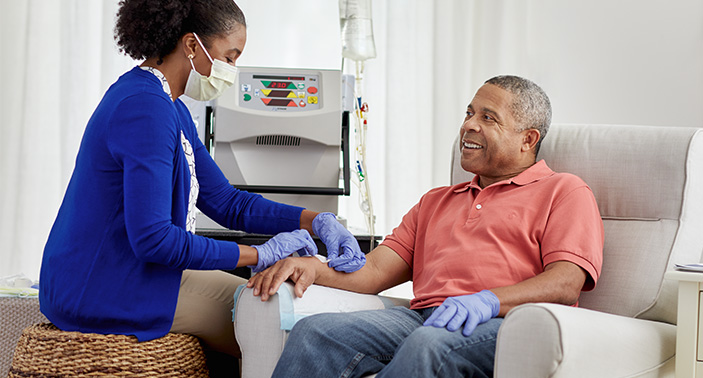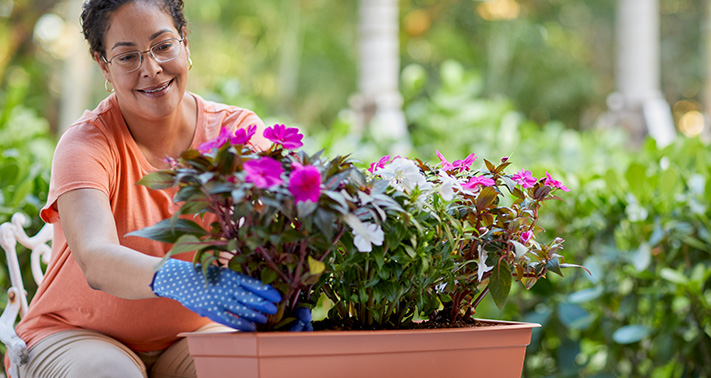Kidney Disease Management
Kidney Disease Management
Kidney Disease Management
Getting diagnosed with chronic kidney disease (CKD) is life changing. Luckily, there are actions you can take at each stage to help with kidney disease management.
By eating well, managing your medications, seeing a nephrologist, and managing other health conditions, like diabetes, high blood pressure, or heart disease, you can stay your healthiest and feel your best.
We’re here to help you learn all you can about managing kidney disease, as well as your physical and emotional health.
By eating well, managing your medications, seeing a nephrologist, and managing other health conditions, like diabetes, high blood pressure, or heart disease, you can stay your healthiest and feel your best.
We’re here to help you learn all you can about managing kidney disease, as well as your physical and emotional health.

Take a free kidney care class
Learn how to look after your kidney health and thrive—in a class that fits your life. Choose an educator-led or self-guided format.
Sign up now3 steps to take after a kidney disease diagnosis
10 lifestyle changes to make when managing kidney disease
- Know your GFR
Glomerular filtration rate (GFR) is a measurement of how well your kidneys are working to clean your blood. Use our GFR calculator to find out your estimated GFR and learn which stage of CKD you may be in. There are specific steps you can take at every stage of CKD to help manage your health and feel your best. - Talk to a kidney doctor
Your nephrologist will work with you and your primary care physician to make sure you get the care you need. Together, you will create a Care Plan based on your CKD stage and your unique health needs. This Care Plan will be the blueprint for you and your care team as you look after your kidneys. - Start a kidney-friendly diet
In some cases, making a few changes to your diet may impact your overall health and help you manage chronic diseases like diabetes, high blood pressure, and cardiovascular disease. Eating well and following a kidney-friendly diet is also key to keeping your kidneys working as long as possible. - Get active
Doing just a little more physical activity every day is great for your health—and getting into a regular exercise routine is even better. Simply taking a walk is exercise that provides you with immediate and ongoing benefits. Talk to your doctor about starting a workout program that's right for you. - Take medication as prescribed
When your kidneys don't function the way they should, prescription and over-the-counter medications, such as nonsteroidal anti-inflammatory drugs, can build up in your blood. This may cause additional damage to your kidneys or other parts of your body. Your nephrologist will help you determine which medications support your kidney function and overall health. - Manage diabetes
Diabetes is the leading cause of chronic kidney disease (CKD). 1 in 3 adults with diabetes may have chronic kidney disease*. It’s important to control your diabetes by monitoring and managing your blood sugar so you can be your healthiest. - Quit smoking
Using tobacco or exposure to secondhand smoke can cause health complications if you have CKD. There are many resources that can assist you. Talk to your doctor about nicotine replacement therapies (NRTs) and programs or helplines to help you quit smoking. - Manage blood pressure
If you've been diagnosed with high blood pressure (hypertension), it's important to follow your doctor's recommendations to keep blood pressure under control. For example, take blood pressure medicines exactly as prescribed. - Continue doing your favorite activities
Staying active and engaged in your social life and hobbies at any stage has big benefits. People who work, volunteer, or stay involved in activities while managing kidney disease may experience improved self-esteem, heightened mental stimulation, more socialization, and greater personal satisfaction. When it's time to consider treatment for ESRD, choose a treatment option that fits your lifestyle. - Communicate
Good communication is vital to coping with CKD. If you have questions or feel stuck, talk to your care team. They can help support you and your family and answer any questions you have. Also, talk to others who have been in your shoes by joining our Kidney Care Community.
We’re here to help you learn all you can about kidney disease management. By making some small, simple additions to your routine, like those listed above, you can stay your healthiest and feel your best.
Get our
e-newsletter
e-newsletter
Get the latest news in kidney care and delicious kidney-friendly recipes, plus inspiring stories from people living with kidney disease.




